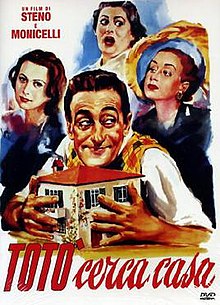Toto Looks for a House
| Toto Looks for a House | |
|---|---|
 Film poster | |
| Directed by | Mario Monicelli Steno |
| Written by | Age & Scarpelli Mario Monicelli Steno Vittorio Metz |
| Produced by | Antonio Mambretti |
| Starring | Totò |
| Cinematography | Giuseppe Caracciolo |
| Edited by | Renato Cinquini |
| Music by | Carlo Rustichelli Amedeo Escobar |
Release date |
|
Running time | 76 minutes |
| Country | Italy |
| Language | Italian |
Toto Looks for a House (Italian: Totò cerca casa) is a 1949 Italian comedy film directed by Mario Monicelli and Steno.[1] The film is stylistically related to Italian neorealism, though it can be seen as a parody. It was a commercial success, being the second most popular film at the box office that year.[2]
Plot
[edit]In an post-war period Italy, the problem for every citizen is to find a comfortable place to live. Beniamino Lomacchio (Totò) is one of the many people without a home and, together with his family, he has been living in a school. He cannot live there much longer, though, because school re-opens in September. Beniamino is a poor clerk and does not know what to do; he just hopes he'll find a comfortable apartment with a landlord who doesn't ask for too much rent.
One day, however, Beniamino finds a place to move into: a cemetery caretaker's house. Not all the family is convinced it's a great idea. They stay there for a short while, fleeing when they think they see a ghost. After leaving the house, Beniamino finds another job at the studio of an artist. But even here the family Lomacchio will not agree with Beniamino. They then find a large apartment. But they've been cheated; the apartment has already been rented out to another family. Eventually, even after staying in the Colosseum, Beniamino is in a car accident. He has finally found a home: a psychiatric hospital.
Cast
[edit]- Totò as Beniamino Lomacchio
- Alda Mangini as Amalia, la moglie de Lomacchio
- Lia Molfesi as Aida, la figlia
- Mario Gattari as Figlio
- Aroldo Tieri as Checchino, il fidanzato
- Folco Lulli as Turco
- Enzo Biliotti as Il sindaco
- Mario Castellani as Truffatore
- Pietro De Vico as Cinese
- Flavio Forin as Vedovo
- Giacomo Furia as Pasquale Saluto
- Marisa Merlini as Patronessa
- Luigi Pavese as Capo ufficio
- Cesare Polacco as Vice custode
- Alfredo Ragusa as Bidello
References
[edit]- ^ "Mario Monicelli obituary". guardian.co.uk. London. 30 November 2010. Retrieved 30 November 2010.
- ^ Bondanella p.113
Bibliography
[edit]- Bondanella, Peter. A History of Italian Cinema. Bloomsbury Publishing, 2009.
External links
[edit]
- 1949 films
- 1949 comedy films
- Italian comedy films
- 1940s Italian-language films
- Italian black-and-white films
- Films set in Rome
- Films directed by Mario Monicelli
- Films directed by Stefano Vanzina
- Films scored by Carlo Rustichelli
- Films with screenplays by Age & Scarpelli
- 1940s Italian films
- Films about the Colosseum
- Post-war period
- 1940s Italian comedy film stubs
